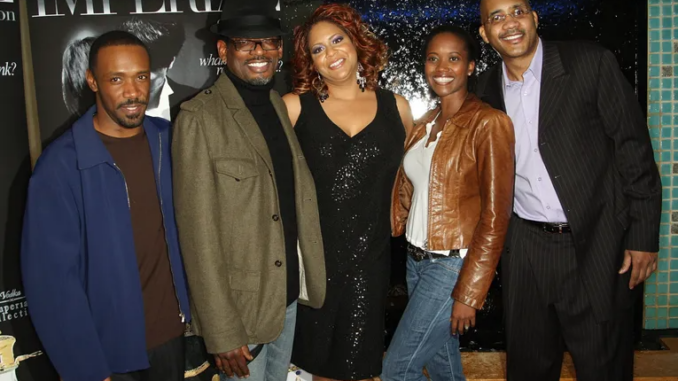
We Relived the Black, Feminist Magic of “Living Single” and You Can Too
Living Single, the quintessential sitcom of the 90s — at least for Black women — was finally added to Hulu’s online streaming in January. Rejoice and binge!
In an era of cash-grab reboots and seemingly-identical multi-camera sitcoms lacking identity or, apparently, purpose, it’s comforting to return to one of the OGs. Living Single created the tropes that now saturate TV, but pleasantly, over 20 years later, it still holds up.
The ’90s were chock-full of incredible Black sitcoms: A Different World, Family Matters, the Fresh Prince of Bel-Air, and my personal favorite as a young person, My Brother and Me, showed for-the-time diverse representations of Black life. In retrospect we can see that it’s overwhelmingly upper/middle class, cis, straight Black life, but at least we weren’t all in poverty or just sidekicks, tokens, and/or comic relief. Living Single was also the very first primetime comedy developed by a Black woman, Yvette Lee Bowser!
And it shows. A perfect example of 90s Black feminist media, the show makes plain its message and aesthetic with its theme song, performed by Queen Latifah — who also plays main character Khadijah, in one of her first major acting roles. “I]n a nineties kind of world/ I’m glad I got my girls/…Whenever this life gets tough, you gotta fight/ With my homegirls standing to my left and my right.”
The series focuses on the professional, personal, and — especially — love lives of four single Black women in their mid-to-late 20s as they attempt to find fulfilling relationships and career success in New York City. Living Single premiered in 1993, a year before Friends, five years before Sex and the City, and long before Girls. All of these shows (and so many others) are about a group of single professional women in a big city, and all of them borrowed Living Single’s premise —except with all-white casts). Living Single also premiered years before the Spice Girls brought “Girl Power” to the masses and ushered in a mainstream ’90s feminism that owed a lot to the show.

Looking at Living Single from 2018 is interesting. Unlike many ’90s (and, honestly, 2000s) sitcoms, which don’t hold up because of their pervasive casual misogyny and transantagonism, Living Single seems remarkably ahead of its time and offers meaningful messages that continue to resonate.
Knowing what we now (sort of) know about Queen Latifah, I was excited for a rewatch to see whether any lesbianism would work its way to the surface. While Latifah has played straight characters for most of her career, it’s a little disappointing in retrospect to see main character Khadijah join her peers in pining over men (who, true to ’90s Black mainstream media tropes, all appear to be ain’t shit). However aggressively heterosexual she plays her character, though, something that’s so refreshing about Living Single is how resolutely these women choose their friendships over their relationships with men.
Well, most of the time. As early as the second episode, Maxine and Regine have a falling out when Maxine dates Regine’s ex. By the end of the episode, though, they resolve to always prioritize each other and to never let a man get between them — unless he’s “really fine,” of course, then “all bets are off.” It’s funny in context, especially given the cackling that follows. And the next scene sees them all in pajamas, gettig ready for bed and singing about how much they love each other.
This factor is a consistent joy throughout the rewatch. The women have wildly different opinions about the issues they face, and butt heads often, but always seem to respect each other. A common thread in contemporary sitcoms is that writers and producers seem to confuse being mean with being funny. Khadijah and Regine, especially, rib each other constantly, but you can always see that the love is there. This is something that Black people will immediately recognize — it’s called “signifyin’” or “playing the dozens” — but something non-Black communities seem to struggle with.